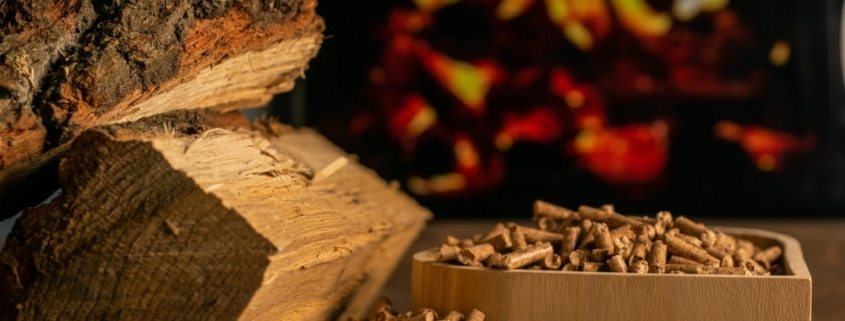Do You Know the Difference Between a Pellet Stove vs. a Wood Stove?
In the quest for efficient and environmentally friendly heating solutions, both pellet and wood stoves are popular choices for homeowners. These two heating appliances aim to provide warmth and comfort during colder months, but which is the better choice?
We’ll compare pellet stoves vs. wood stoves so you can decide the best choice for your home.
Comparing Pellet Stoves vs. Wood Stoves
What is a Pellet Stove?
A pellet stove is a modern heating appliance that burns compressed wood or biomass pellets. The pellets are made from renewable materials, such as wood chips, sawdust, agricultural waste, or other biomass materials.
Pellet stoves consist of a hopper that stores the pellets, an auger system to feed them into the combustion chamber, and a fan to control the intensity of the fire and distribute the heat. They can be easily automated with programmable thermostats, ensuring steady and consistent warmth throughout the space.
Pellet stove brands we love:
What is a Wood Stove?
Wood stoves are traditional heating appliances that burn chopped wood logs. The stoves can be made from cast iron or steel and consist of a firebox and flue that allows smoke and gasses to escape while retaining heat into the surrounding space.
Using natural firewood for heat offers a rustic and cozy ambiance that many homeowners cherish, but their efficiency can vary based on factors such as wood quality, combustion, and insulation.
Wood stove brands we love:
The Pros and Cons of Pellet Stoves vs. Wood Stoves
While pellet and wood stoves serve the purpose of heating homes, they differ in fuel type, automation, maintenance, and environmental impact. Choosing between the two depends on individual preferences, heating requirements, and considerations for convenience and sustainability.
Pellet Stoves: The Pros
- High Efficiency: Pellet stoves offer higher efficiency than wood stoves, as the combustion process is better controlled.
- Convenient Automation: Pellet stoves can be easily automated with programmable thermostats, allowing precise temperature control.
- Cleaner Operation: Pellet stoves produce minimal ash and emissions, making them a cleaner and more eco-friendly heating option.
- Consistent Heat Output: With automated fuel feed, pellet stoves provide a more consistent and even heat distribution.
Pellet Stoves: The Cons
- Dependence on Electricity: Pellet stoves rely on electricity to power the auger system and the fans, which means they won’t work during power outages.
- Limited Fuel Source: While pellets are made from renewable materials, their availability might be limited in some areas, leading to higher fuel costs.
- Higher Upfront Cost: Pellet stoves are generally more expensive to purchase and install compared to wood stoves.
- Mechanical Issues: The complexity of the auger and fan systems can lead to potential mechanical problems, requiring maintenance and repairs.
- Maintenance: Creates ash and debris that may need to be cleaned out daily. Plus, if the pellets get wet, they expand back into sawdust, which means storage could get messy.
Wood Stoves: The Pros
- Natural and Traditional: Wood stoves provide a nostalgic and cozy ambiance with the crackling sound of burning logs.
- Renewable Fuel Source: Wood is a renewable resource, making it a sustainable heating option if responsible harvesting practices are followed.
- Independence from Electricity: Wood stoves do not rely on electricity, ensuring continued heating even during power outages.
- Cost-Effective: In regions with abundant wood supply, wood logs can be a cost-effective heating solution compared to other fuel sources.
Wood Stoves: The Cons
- Lower Efficiency: Heat is lost through the chimney along with smoke and gasses, resulting in wood stoves typically having lower efficiency compared to pellet stoves.
- Regular Maintenance: Wood stoves require frequent cleaning to remove ash and soot buildup, which can be time-consuming.
- Environmental Impact: While wood is a renewable resource, burning wood releases carbon dioxide and other pollutants into the atmosphere, contributing to air pollution.
- Note: In 2020, the EPA (United States Environmental Protection Agency) introduced a policy that significantly reduces the amount of emissions released from wood stoves. Now the units burn cleaner and with less particulate matter than older wood-burning units – so that’s a great improvement!
- Inconsistent Heat: Heating with wood can lead to uneven temperature distribution – the fire’s intensity varies based on the type and quality of wood used.
Vandcl Brothers Is Here to Heat Your Home
Whether you opt for a wood stove or pellet stove, you can trust VanderWall Brothers to be your trusted partner in providing top-notch heating solutions for your home. We offer seamless installation and reliable maintenance services for both stove types, and our commitment to customer satisfaction means we take the time to understand your specific heating needs. We can even help you choose which one is best for your home.
Contact VanderWall Brothers today for all your home heating needs!



